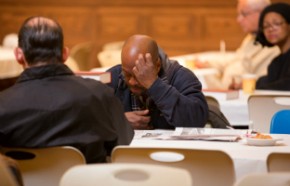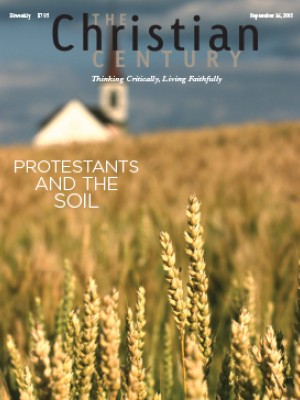Soup-kitchen church

The guests streamed into the soup kitchen of West End Collegiate Church, shaking off the bitter cold from New York City’s winter. Many of them lived outside, so they were used to being rejected from public spaces like museums or churches. But the members of West End follow the Benedictine credo: “Welcome everyone as if you are welcoming Christ.” So the weary men and women knew they could rest here. They shrugged off their backpacks and coats, and settled into their seats in anticipation of the Bible study held before the meal. It was Advent, so associate pastor Jes Kast-Keat lit the first two purple candles of the wreath. The smell of smoke rose and mingled with the food, and a guest called out, “Let’s go to church today, pastor!”
Kast-Keat brightened. The guest had articulated a hope that had been forming within her. She’d been hearing other people echo her thought around tables, in their greetings, and as they said goodbye: “This is my church.” Those declarations felt right, as if they were creating something by naming it. They could sense the sacred space in the soup kitchen. They had been gathering for worship.
Read our latest issue or browse back issues.
Actually, this community had been coming together for hundreds of years. Historians believe that Comforters of the Sick, or Ziekentroosters, first conducted religious services for the small colony of New Netherland on Manhattan Island. In 1628 an ordained minister arrived and began the Reformed Dutch Church in America. West End Collegiate is part of the Collegiate Reformed Protestant Dutch Church, and the oldest Protestant church with a continuing organization in America. There are four other Collegiate Churches of New York City: Marble, Middle, Fort Washington, and Intersections. West End, which was established as a center for the Dutch refugee and relief efforts, is now in an affluent neighborhood a couple blocks away from Central Park.
According to Kast-Keat, the location gives the members of West End Collegiate Church an opportunity. Kast-Keat asked, “How could those in homes get to know their neighbors, when the person who sleeps on the street is their neighbor?” In the 1980s, church members worked to answer that question. They took action by starting a soup kitchen and offering an optional Bible study.
When Kast-Keat learned that guests had often been rejected by churches, she wanted to make sure that they would have a long-term welcome at West End and a space to worship. So she structured an order of worship around the Bible study, giving participants more leadership and voice. The guests read the scriptures and led the prayers of the people. Kast-Keat did not preach from a manuscript but invited conversation during the sermon. At the end of the service, everyone prayed the Lord’s Prayer in unison.
These components invigorated the worship and unified the worshipers. “When people are in survival mode on the streets,” said Kast-Keat, “there’s something powerful about being able to say a prayer together.” As the words reverberated from mouth to mouth, the congregants realized that they were not alone. Then they ate together, breaking bread with one another, and their connection deepened.
More people began attending the service, until the day when one guest named what was happening: church, a worshiping community separate and yet still connected to the larger congregation.
Kast-Keat has told the West End congregation what’s happening, and its members are discerning what it means to have a church forming in their chapel. They’re considering questions of polity and governance, like whether members should vote to serve communion, and working to rename the feeding program so that the name reflects the worshiping community. West End Collegiate has a creative spirit, and welcomes the opportunity to try out new things. Members keep this spirit alive as they work through the trials, mistakes, and excitement of this possibility. “We don’t have this all figured out,” Kast-Keat said.
I asked her about having the worship service so closely related to the feeding program. Did it ever feel coercive? Did people worry that they had to worship so they could eat? Did they feel as if they needed to be Christian in order to receive food?
We’d both been aware of organizations that try to force God onto vulnerable populations. They proselytize the homeless, giving goods and services in exchange for conversion. But Kast-Keat assured me that West End does not force-feed God. Everyone is welcome around the table. West End makes sure that people can come to the table together regardless of their faith tradition or lack of tradition. The members indicate this through the music they play, through their greetings, and in their ongoing interactions with diners and worshipers.
“The colonial idea is ingrained in our culture,” Kast-Keat said, and explained that West End is aware of its power. “But our job is not to bring God to the neighborhood. God is already there. We are bearing witness to God.”






